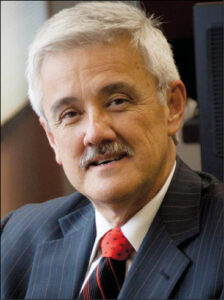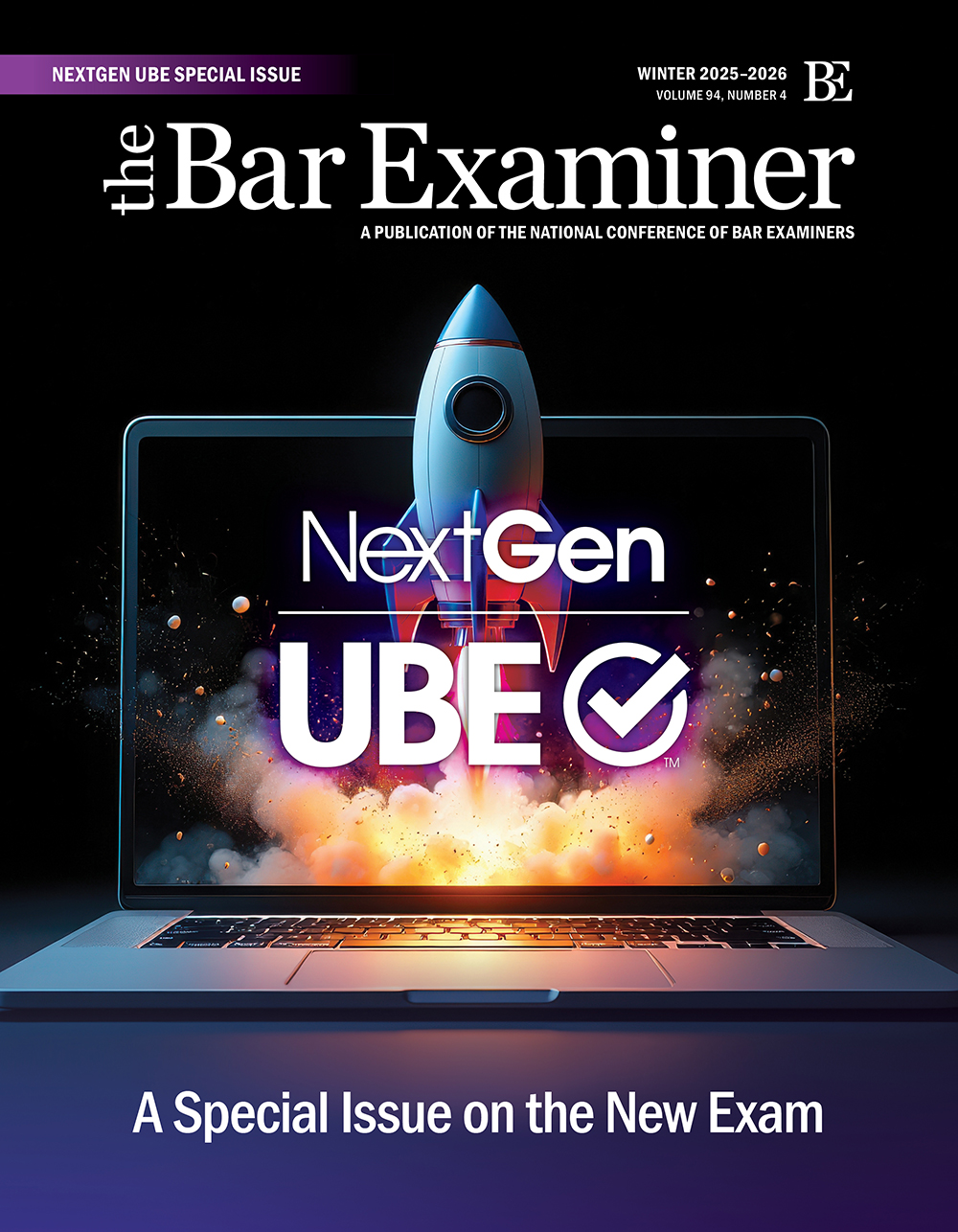This article originally appeared in The Bar Examiner print edition, Winter 2023-2024 (Vol. 92, No. 4), pp. 17–19.
By William E. Adams, Jr. In April 2022, the Council of the ABA Section of Legal Education and Admissions to the Bar announced the formation of a Strategic Review Committee (hereinafter SRC).1 The Council periodically appoints an ad hoc committee to supplement the ongoing work of its Standards Committee and conduct a more comprehensive review of the Standards and Rules of Procedure for Approval of Law Schools or its specific segments.
In April 2022, the Council of the ABA Section of Legal Education and Admissions to the Bar announced the formation of a Strategic Review Committee (hereinafter SRC).1 The Council periodically appoints an ad hoc committee to supplement the ongoing work of its Standards Committee and conduct a more comprehensive review of the Standards and Rules of Procedure for Approval of Law Schools or its specific segments.
Since its formation, the SRC has recommended several helpful and important improvements to the Council’s regulations. This article addresses two such improvements pertaining to distance-education allowances and academic freedom in law schools.
The Council of the Section of Legal Education and Admissions to the Bar of the American Bar Association (ABA) is the recognized accreditor of the JD program at American law schools by the US Department of Education.
The Standards and Rules of Procedure for Approval of Law Schools, published by the ABA Section, detail the Council’s requirements that a law school must meet to obtain and retain ABA accreditation. Many jurisdictions limit eligibility for bar admission to graduates of ABA-approved law schools.
The US Department of Education directs the accreditors it authorizes to undertake regular and systematic review of its accrediting standards. The Council typically accomplishes this through its Standards Committee, which is charged with reviewing changes or additions to the Standards; these proposed changes are then referred to the Council for review and recommendations.
Increased Credits Allowed for Distance Education
The ABA Council’s standards regarding distance education, expressed in Standard 306, have historically been more restrictive than other accrediting agencies’. Most accrediting agencies regulate how remote learning is conducted, but not the number of credits a student could earn toward education via distance-education technology. When the SRC undertook its review of the distance-education Standard, law students could earn one-third of the credits needed for graduation through distance education. The Standards also limited the number of distance education credits that could be earned in the first third of a student’s education.
The Council has since expanded this allowance so that students can now earn up to 50 percent of the credits needed for graduation through distance education. The Council has also removed the limits on the number of credits earned in the first year of legal education. It has also approved more specific directions about what is expected when law schools choose to use distance-education technology.
In addition to these changes, which went into effect in August 2023, the Council sent for comment in January 2024 a proposal about potential amendments to the Standards to permit approval of fully online law schools, in addition to brick-and-mortar schools with distance-education programs. Some in the profession had called for such a proposal, as did advocates who want the Council to consider ways to permit less costly ways to pursue legal education. Comments will be considered at the Council’s May 2024 meeting.
Exploring Expanded Use of Remote Learning
To digress for a moment from the SRC’s activities, the Council has also demonstrated its willingness to explore the expanded use of remote learning. Through its variance process,2 the Council has approved 17 experimental law school programs that provide the opportunity for students to obtain all or nearly all the credits required for graduation through distance-education programs. The schools that have received variances have offered different combinations of in-person and online courses, as well as differing amounts of synchronous and asynchronous courses.
Many of the programs have only recently begun admitting and teaching students, so it is too early to draw definitive conclusions. However, at this stage, the Council’s required assessments of these experimental programs show that the academic progress of students does not statistically differ between those in person and online at the same school.3
A New Standard Supporting Academic Freedom
In addition to its review of the distance-education standards, one of the SRC’s initial goals was to revise its Standard on academic freedom. Former Standard 405(b) required schools to have an established policy on academic freedom but provided little additional guidance. Since the SRC began discussing revisions, the media has reported incidents at some law schools involving disruptions of invited speakers’ presentations. These incidents helped inform the SRC of some of the issues, although its proposal was not directly in response to any specific incident. In addition to these events, there have also been legislative and other measures aimed at restricting the teaching of theories or subjects that potentially affect academic freedom.
After extensive study, including a roundtable that invited individuals with expertise in academic freedom and the First Amendment from within and outside of legal education, the SRC recommended—and the Council approved—a proposal for a new Standard, which was sent to interested parties for comment in August 2023. Most of the comments received related to this proposal supported the addition of a broader standard.
After reviewing the comments and making revisions in response, the Council at its November 2023 meeting approved for sending to the ABA House of Delegates a new Standard 208, which seeks to ensure that law schools properly protect academic freedom for teachers and freedom of expression more broadly in the law school. The House of Delegates voted at the February ABA Midyear Meeting to approve the creation of this new Standard.
Standard 208 accomplishes the following: (1) moves the discussion of academic freedom from Standard 405(b), more specifically addresses the scope and application of a school’s required policy, and decouples the issue of academic freedom (which will apply to all those teaching in the law school) from security of position (which applies only as specified in Standard 405); (2) adds a new discussion of freedom of expression modeled on policies adopted by law schools and universities nationwide; and (3) places the Standard in Chapter 2 (Organization and Administration) because these requirements, like others in that chapter, concern the law school’s operation generally and are not specific to topics addressed in other chapters, such as Chapter 3 (Program of Legal Education) or Chapter 4 (Faculty).
Since academic freedom doctrine historically has applied to faculty, the existing Standard could not reasonably be interpreted to apply to situations not involving faculty or incidents involving invited speakers or non-faculty law school personnel. Thus, this broader measure will require schools to have policies that extend protection and define what is protected.
As with other similar measures, the Council will expect schools to exercise their discretion to reasonably enforce policies as opposed to trying to second-guess every event or incident. Section 208(b)(2) requires that a law school’s free expression policies must “[p]roscribe disruptive conduct that hinders free expression by preventing or substantially interfering with the carrying out of law school functions or approved activities, such as classes, meetings, library services, interviews, ceremonies, and public events.” However, Section 208(b)(1) also requires that the policies must “[p]rotect the rights of faculty, students, and staff to communicate ideas that may be controversial or unpopular, including through robust debate, demonstrations, or protests.” Several Interpretations provide further guidance on how the Standard will apply.
The SRC completed its work in 2023, but the Council’s Standards Committee will continue its ongoing review with an eye toward continuing to help improve legal education.
READ MORE:
For more in the Bar Examiner about the ABA Section and the accreditation process, see “New to Bar Admissions? What You Might Like to Know About: The ABA’s Connection to Bar Admissions,” 90(1) The Bar Examiner 86–88 (Spring 2021).
Notes
- The Strategic Review Committee is comprised of members of the standing Standards Committee, with an additional Council member and three external, non-Council members. Its members include:
- Scott Bales, Chief Justice (retired), Arizona Supreme Court
- Mary Lu Bilek, Dean (retired), CUNY School of Law
- Craig Boise, Dean, Syracuse University College of Law
- Becky King, Accreditation Counsel (retired), ABA Section of Legal Education and Admissions to the Bar
- Cynthia Martin, Chief Judge, Missouri Court of Appeals, Western District
- Charles Nash, Senior Vice Chancellor Emeritus for Academic & Student Affairs, University of Alabama System
- Carla Pratt, Dean and Professor, Washburn University School of Law
- Barbara Sestak, Professor, Portland State University School of Architecture
- Adrien Wing, Associate Dean for International & Comparative Law Programs and Professor, University of Iowa College of Law
- Kirsten Winek, Accreditation Counsel, ABA Section of Legal Education and Admissions to the Bar (ABA Staff Liaison) (Go back)
- The variance process, as expressed in Standard 107 and Rule 28, allows a law school to apply to the Council for a variance under certain circumstances if it is proposing to make any change that is or may be inconsistent with one or more of the Standards. (Go back)
- The schools granted variances can be found at https://www.americanbar.org/groups/legal_education/resources/distance_education/approved-distance-ed-jd-programs/. (Go back)
 William E. Adams, Jr., has served as the Managing Director for the Council of the ABA Section of Legal Education and Admissions to the Bar since 2020. Prior to that, he served for six years as the Council’s Deputy Managing Director.
William E. Adams, Jr., has served as the Managing Director for the Council of the ABA Section of Legal Education and Admissions to the Bar since 2020. Prior to that, he served for six years as the Council’s Deputy Managing Director.
Contact us to request a pdf file of the original article as it appeared in the print edition.








